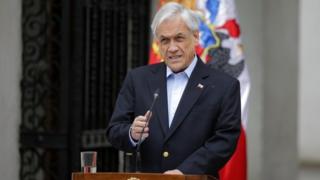
Image copyright
AFP
Sebastián Piñera said his government needed to concentrate on “re-establishing public order”
Chile has pulled out of hosting two major international summits, including a UN climate change conference, as anti-government protests continue.
President Sebastián Piñera said the decision “caused him a lot of pain” but his government needed “to prioritise re-establishing public order”.
The COP25 climate summit was scheduled for December, while the Apec trade summit was due next month.
The UN said it was now “exploring alternative hosting options”.
Chile’s decision comes amid global climate protests, including a week of strikes led by environmental activist Greta Thunberg last month.
And as the news was announced, a US-based organisation also separately revealed that millions more people are at risk of coastal flooding from climate-driven sea-level rise within the next century than previously thought.
Meanwhile, it was hoped the Asia Pacific Economic Cooperation (Apec) forum – due to be held in Santiago from 15 to 17 November – would help ease tensions between the US and China.
White House officials said US President Donald Trump had been planning to meet Chinese President Xi Jinping at Apec, to discuss a possible trade deal.
The two nations have been locked in an escalating trade war for some 18 months.
This is a huge blow to hopes of progress on what many see as the crisis of climate change.
Just as the science becomes more robust about rising carbon levels driving up temperatures and triggering a range of dangerous impacts, diplomats and experts have been looking to the COP25 talks in December as a vital staging-post on the way to global action.
In particular developing countries – the most vulnerable to the effects of rising sea levels and stronger storms – were banking on the event to raise their claims for more help from the richest nations.
But the longer the unrest has continued on the streets of Santiago, the more the government of Chile must have worried about coping. Already there were reports of delays in building the massive conference venue for the tens of thousands of delegates and campaigners.
Now there’ll be a frantic search for another venue, and soon.
What’s going on in Chile?
At least 20 people have been killed since the mass protests in Chile began.
While many protests were peaceful there were also deadly incidents of arson and looting, as well as violent clashes between the security forces and protesters.
They have shown little sign of abating despite Mr Piñera announcing measures to ease Chileans’ discontent with high levels of inequality and other grievances.
Image copyright
Reuters
More than one million people are believed to have attended a rally in Santiago last weekend
More than 7,000 people have been arrested and the response by Mr Piñera’s government to the protests has come under heavy criticism.
He declared a state of emergency and night-time curfews in many of Chile’s major cities but the measures only seemed to further incense protesters.
A rally on Saturday is estimated to have drawn more than one million people to the streets of Santiago, in what organisers said was the largest demonstration since democracy was restored in Chile in 1990.

















